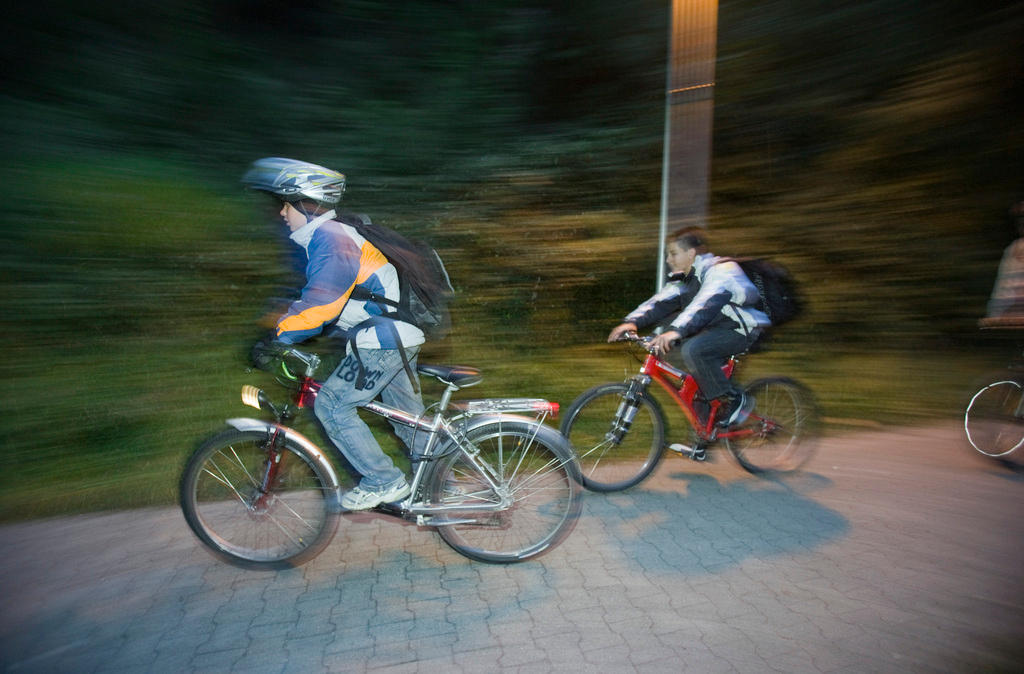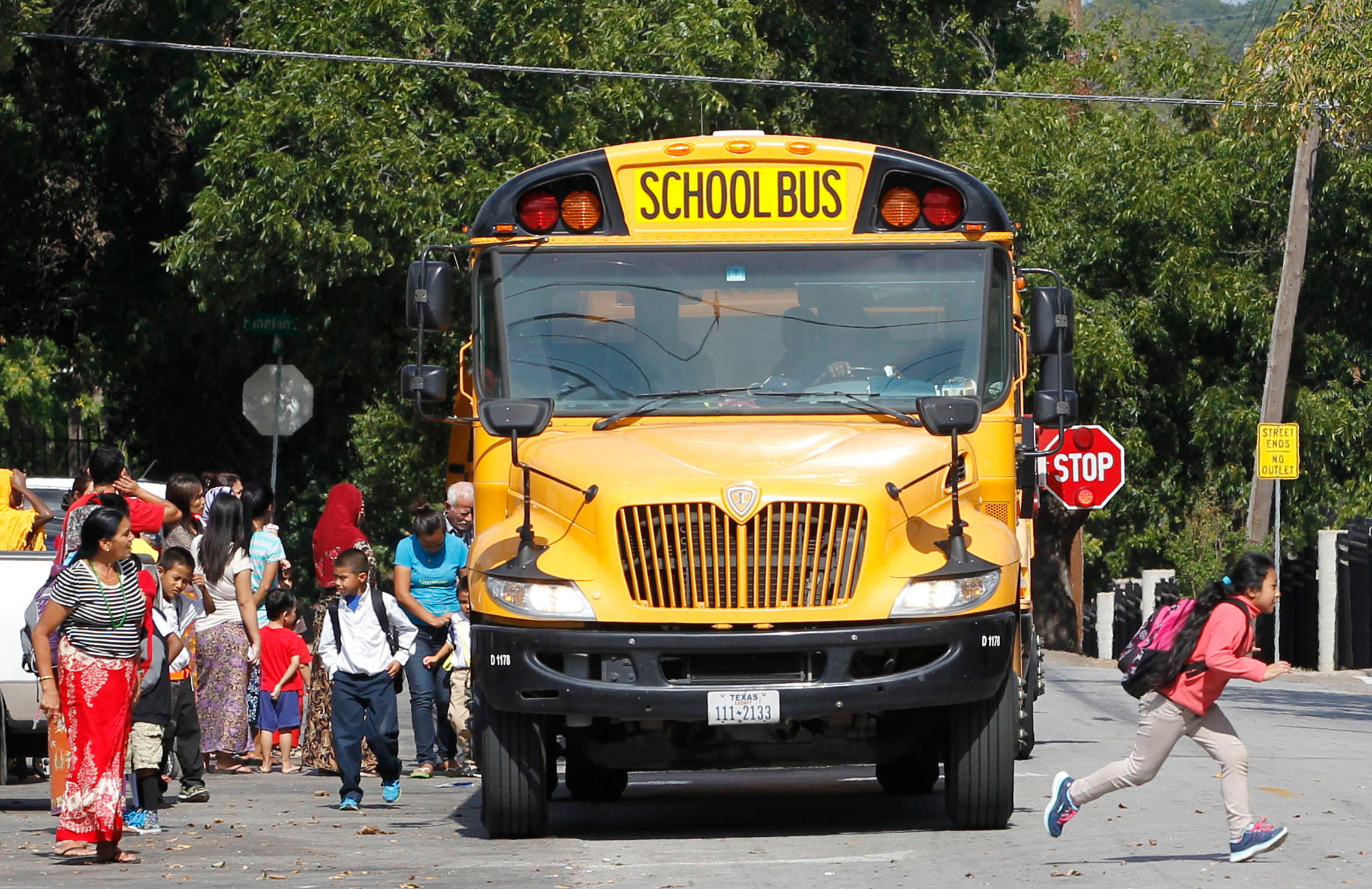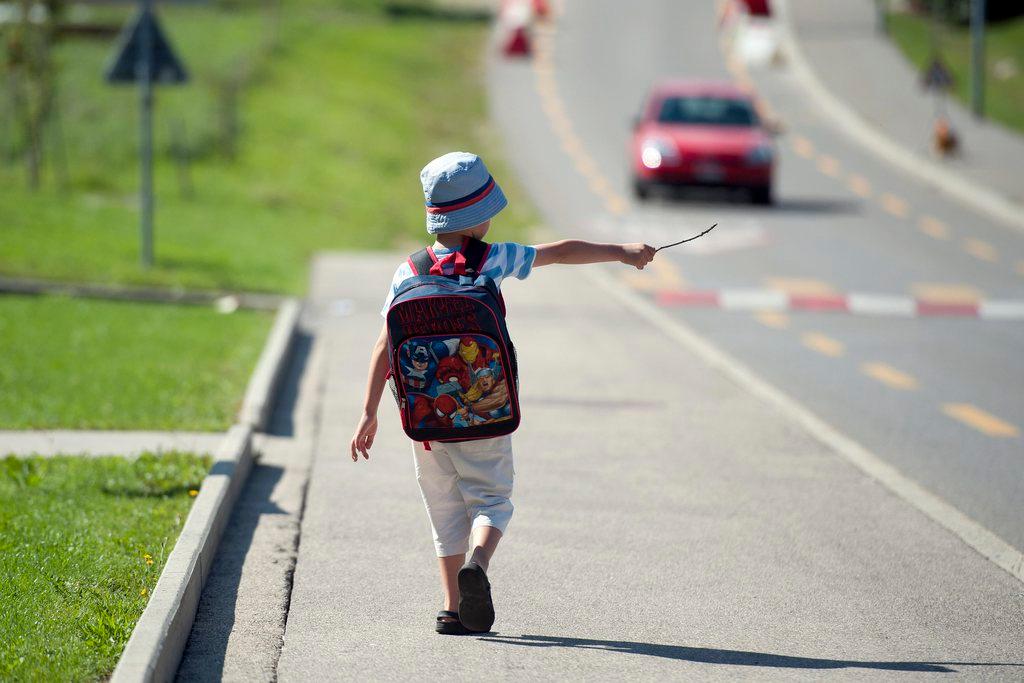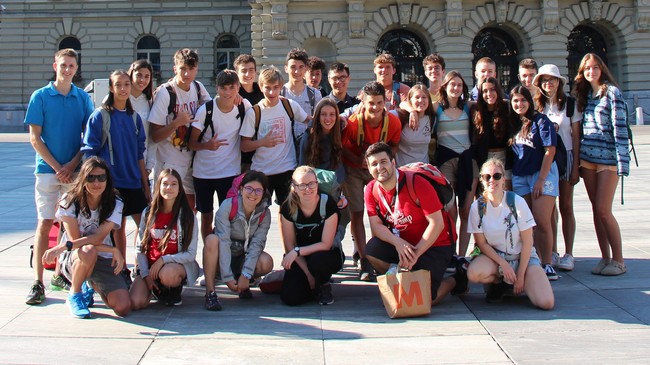
Swiss resist fear-based childrearing – for now

Children in Switzerland typically walk or play outside each day without strict supervision, part of a cultural legacy put at risk by fearful headlines that play into parental anxieties.
When business consultant Christoph Hunziker returned to Bern with his family from more than a year in Peru, it took just one day for his 6-year-old son to get used to going to Kindergarten alone.
The walk is only a few hundred metres, along a path in a field between apartment buildings, but then he has to traverse the entrance to a parking garage. It turned out to be an important rite of passage.
“It made him really more independent. And also more mature, I think. And responsible,” Hunziker said.
In Switzerland, just like in the United States, Canada and some other developed nations in generations past, it is common to see children trudging along city streets to school and back home again, or stopping at a playground, out of earshot or away from the prying eyes of parents.
“I think for kids to be independent as much as possible is something quite normal,” said Alexander Renggli, a diplomat with the Swiss foreign ministry and father of two in Bern, who sees a possible tie-in with Switzerland’s political system of direct democracy. “Maybe it’s part of also a fundamental political value we have in Switzerland. It’s what we call self-responsibility.”
Renggli spent much of his childhood abroad in places where he could not go out by himself, but as a parent he appreciates the Swiss way.
“I could well imagine that this also translates down into basic ways, how we’re being socialised, how we’re being raised as kids, in a way that you’re expected to grow up rather quickly, or at least to take responsibility, and be responsible for yourself,” he said.
American fears
Many of the crime ratesExternal link in the US are lower than when middle-aged parents grew up and took for granted walking to school or playing on their own in their neighborhood. That’s also true with some crime rates in nations such as the United Kingdom, Canada and Australia.
And that’s one of the main points of the “Free-Range Kids” parenting movementExternal link in the US. It grew out of Lenore Skenazy’s popular bookExternal link, “Free-Range Kids: How to Raise Safe, Self-Reliant Children (Without Going Nuts with Worry)”.
Skenazy, who penned the book after writing a newspaper columnExternal link about letting her 9-year-old son ride the subway alone in New York City in 2008, said Switzerland provides a good example of not “overprotecting” children.
“Freedom is an essential part of life,” said Skenazy, now a professional speaker who has hosted a TV reality show. “If the parents are always there mediating the problems and the fears, the dangers and the confusions, then you’re raising kids who haven’t had experience doing that on their own.”
The sight of children going by themselves between home, school and playground is common not just in Switzerland but also in a few other wealthy countries like Germany, Japan and the Netherlands.
“I feel like those countries haven’t lost their minds to fear,” she said. “People think I’m promoting something new. It’s something old. I’m the opposite of a revolutionary. I’m a reactionary.”
The emphasis on promoting self-reliance in children by allowing them more independence contrasts with some other developed countries, notably the US, which only recently passed a federal law that allows children to go to school by any means that parents believe is “age appropriate”.

The law reflected a national debate about parenting styles – and how far the US government should go to protect children – brought on by police cases involving parents who let their kids walk and play alone.
One of the high-profile cases involved parents in the Washington, D.C. area who were charged with child neglect for allowing their two children, then aged 6 and 10, to walk home from a local park during the day. The police finally cleared the parents of any wrongdoing.
Skenazy points to the crime rates to show things are far safer in the US than many people think. But people give in to their fears, she said, because “the brain works like Google” by sometimes elevating the importance of a single incident – a phenomenon also seen in Switzerland.
Swiss cases
In 2007, the disappearance of a five-year-old girl in the eastern town of Appenzell led to soul-searching over child protection in traditionally “safe” Switzerland, where cases of missing kids and child murders are rare.
This summer, a 12-year-old boy’s disappearance from a town in canton Solothurn highlighted some of the dangers of the digital age.
The boy was found at the home of a 35-year-old man in Düsseldorf, Germany. They met online while playing an internet game. The police arrested the man on suspicion of sexual abuse of a minor and false imprisonment, and said he possessed child pornography.
It is these types of incidents – and the incessant news cycle – that makes some educators worry that Switzerland might eventually change its norms. Babette Domig, a recently retired primary school teacher in Bern, said many Swiss families traditionally ran farms and lacked time to overprotect kids.
“Having more time, having more information, knowing more (about the world), sometimes doesn’t only help. I think this is how it’s working for the moment,” she said.

More
Trusting your children
Domig, however, said she hopes children will continue to be given a healthy dose of independence so they can make friends, talk among themselves, and learn about the world including how to navigate urban traffic – one of the biggest dangers they face.
Try, try again
When children are not allowed to figure things out for themselves, they may later lack the skills they need to cope with hardship. Among her young patients in Switzerland, German clinical psychologist Dorothe Dörholt said she sees similarities.
“A lot of them grew up very sheltered, very protected from everything, or anything negative,” she said. “And later on, suddenly, they leave school, they go off to university, and they’re overwhelmed. They don’t have the tools to deal on their own with the difficulties that they’re facing as young adults.”
Dörholt, also a documentary filmmakerExternal link, says all the places she has lived – Germany, the United States and Switzerland – are safe for children, but parenting strategies vary due to “perceived fear”.
“It has a lot to do with the media. If you see all the time how children are abducted, even though it’s a rare occurrence, you think the world is a dangerous place,” she said.
Children have a natural drive toward autonomy, said Dörholt, and it is important for parents to allow that to happen.
“Because if a child succeeds, it realises, ‘Wow, I’m able to do this,’ she said. “And if the child doesn’t succeed, it realises, ‘Wow, this was difficult. I failed. But I’m still alive. Nothing bad happened, so I can try again.’”
The long walk home
Several parents, including Hunziker, noted that the walk home from school – one of the few times of the week when children can have unstructured time – is even more important for children learning to be autonomous than the morning dash to school, when there’s a deadline to meet.
Hunziker’s son even became angry on the first day of Kindergarten after glimpsing his father watching him. For the father, the transition may have been harder – starting in Peru, where he fretted about Lima’s traffic and other safety concerns.
“When my wife went somewhere with the children, and I stayed at home or was at another place, I used to be really worried,” Hunziker said. “But I learned to let go a bit, just by doing it actually.”
At what age did you let your children walk to school on their own? Let us know in the comments below.
Birth of a movement
Skenazy’s son had been asking his parents to let him find his way home by himself, so one day they left him at a department store atop a subway station. They gave him a map, a fare card to ride the subway, coins for a phone call and $20 in case of emergency. He made it home 45 minutes later.
Days after her columnExternal link appeared, Skenazy was interviewed on national TV and radio programmes – and became a lightning rod for criticism and praise as she defended her actions. The term, “free-range kids”, contrasts with another term, “helicopter parenting”, that describes hovering over children to constantly help or protect them.
In a report last year, the Chicago-based nonprofit Family Defense CenterExternal link examined cases of US parents charged with neglect for letting kids walk to parks, play outside or briefly remain in cars alone. It concluded that parents who made reasonable decisions were unfairly labeled as potential threats to their kids, pushing parents into the child welfare system and wasting government resources.

In compliance with the JTI standards
More: SWI swissinfo.ch certified by the Journalism Trust Initiative
















![The four-metre-long painting "Sonntag der Bergbauern" [Sunday of the Mountain Farmers, 1923-24/26] had to be removed by a crane from the German Chancellery in Berlin for the exhibition in Bern.](https://www.swissinfo.ch/content/wp-content/uploads/sites/13/2025/12/01_Pressebild_KirchnerxKirchner.jpg?ver=cb688ed5)















You can find an overview of ongoing debates with our journalists here . Please join us!
If you want to start a conversation about a topic raised in this article or want to report factual errors, email us at english@swissinfo.ch.